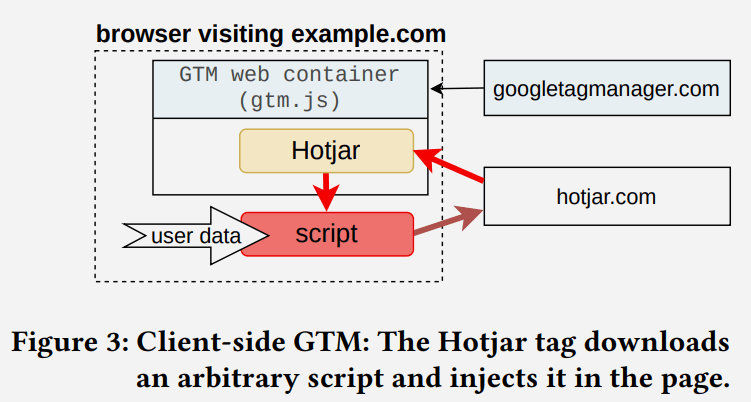Researchers uncover knowledge leaks in Google Tag Supervisor (GTM) in addition to safety vulnerabilities, arbitrary script injections and situations of consent for knowledge assortment enabled by default. A authorized evaluation identifies potential violations of EU knowledge safety legislation.
There are a lot of troubling revelations together with that server-side GTM “obstructs compliance auditing endeavors from regulators, knowledge safety officers, and researchers…”
GTM, developed by Google in 2012 to help publishers in implementing third-party JavaScript scripts, is at present used on as many as 28 million web sites. The analysis research evaluates each variations of GTM, the Consumer-side and the newer Server-side GTM that was launched in 2020.
The evaluation, undertaken by researchers and authorized specialists, revealed a lot of points inherent to the GTM structure.
An examination of 78 Consumer-side Tags, 8 Server-side Tags, and two Consent Administration Platforms (CMPs), revealed hidden knowledge leaks, situations of Tags bypassing GTM permission methods to be able to inject scripts, and consent set to enabled by default with none consumer interplay.
A big discovering pertains to the Server-side GTM. Server-side GTM works by loading and executing tags on a distant server, which creates the notion of the absence of third events on the web site.
Nevertheless, the research confirmed that this structure permits tags operating on the server to clandestinely share customers’ knowledge with third events, circumventing browser restrictions and safety measures like just like the Content material-Safety-Coverage (CSP).
Methodology Used In Analysis On GTM Information Leaks
The researchers are from Centre Inria de l’Université, Centre Inria d’Université Côte d’Azur, Centre Inria de l’Université, and Utrecht College.
The methodology utilized by the researchers was to purchase a site and set up GTM on a dwell web site.
The analysis paper explains intimately:
“To conduct experiments and arrange the GTM infrastructure, we purchased a site – we name it instance.com right here – and created a public web site containing one fundamental webpage with a paragraph of textual content and an HTML login type. We have now included a login type since Senol et al. …have just lately discovered that consumer enter is usually leaked from the varieties, so we determined to check whether or not Tags could also be liable for such leakage.
The web site and the Server-side GTM infrastructure have been hosted on a digital machine we rented on the Microsoft Azure cloud computing platform situated in an information middle within the EU.
…We used the ‘profiles’ performance of the browser to begin each experiment in a contemporary surroundings, devoid from cookies, native storage and different applied sciences than preserve a state.
The browser, visiting the web site, was run on a pc related to the Web by means of an institutional community within the EU.
To create Consumer- and Server-side GTM installations, we created a brand new Google account, logged into it and adopted the advised steps within the official GTM documentation.”
The outcomes of the evaluation comprise a number of essential findings, together with that the “Google Tag” facilitates amassing a number of forms of customers’ knowledge with out consent and on the time of study it introduced a safety vulnerability.
Information Assortment Is Hidden From Publishers
One other discovery was the extent of knowledge assortment by the “Pinterest Tag,” which garnered a big quantity of consumer knowledge with out disclosing it to the Writer.
What some could discover disturbing is that publishers who deploy these tags could not solely be unaware of the information leaks however that the instruments they depend on to assist them monitor knowledge assortment don’t notify them of those points.
The researchers documented their findings:
“We observe that the information despatched by the Pinterest Tag will not be seen to the Writer on the Pinterest web site, the place we logged in to watch Pinterest’s disclosure about collected knowledge.
Furthermore, we discover that the information collected by the Google Tag about type interplay will not be proven within the Google Analytics dashboard.
This discovering demonstrates that for such Tags, Publishers should not conscious of the information collected by the Tags that they choose.”
Injections of Third Occasion Scripts
Google Tag Managers has a characteristic for controlling tags, together with third social gathering tags, referred to as Net Containers. The tags can run inside a sandbox that limits their functionalities. The sandbox additionally makes use of a permission system with one permission referred to as inject_script that enables a script to obtain and run any (arbitrary) script exterior of the Net Container.
The inject_script permission permits the tag to bypass the GTM permission system to achieve entry to all browser APIs and DOM.
Screenshot Illustrating Script Injection

The researchers analyzed 78 formally supported Consumer-side tags and found 11 tags that don’t have the inject_script permission however can inject arbitrary scripts. Seven of these eleven tags have been offered by Google.
They write:
“11 out of 78 official Consumer-side tags inject a third-party script into the DOM bypassing the GTM permission system; and GTM “Consent Mode” allows a number of the consent functions by default, even earlier than the consumer has interacted with the consent banner.”
The state of affairs is even worse as a result of it’s not only a privateness vulnerability, it’s additionally a safety vulnerability.
The analysis paper explains the which means of what they uncovered:
“This discovering exhibits that the GTM permission system carried out within the Net Container sandbox permits Tags to insert arbitrary, uncontrolled scripts, thus opening potential safety and privateness vulnerabilities to the web site. We have now disclosed this discovering to Google through their Bug Bounty on-line system.”
Consent Administration Platforms (CMP)
Consent Administration Platforms (CMP) are a expertise for managing what consent customers have granted when it comes to their privateness. It is a option to handle advert personalization, consumer knowledge storage, analytics knowledge storage and so forth.
Google’s documentation for CMP utilization states that setting the consent mode defaults is the duty of the entrepreneurs and publishers who use the GTM.
The defaults might be set to disclaim advert personalizaton by default, for instance.
The documentation states:
“Set consent defaults
We advocate setting a default worth for every consent sort you might be utilizing.The consent state values on this article are solely examples. You’re liable for ensuring that default consent mode is about for every of your measurement merchandise to match your group’s coverage.”
What the researchers found is that CMPs for Consumer-side GTMs are loaded in an undefined state on the webpage and that turns into problematic when a CMP doesn’t load default variables (known as undefined variables).
The issue is that GTM considers undefined variables to imply that customers have given their consent to the entire undefined variables, regardless that the consumer has not consented in any method.
The researchers defined what’s occurring:
“Surprisingly, on this case, GTM considers all such undefined variables to be accepted by the tip consumer, regardless that the tip consumer has not interacted with the consent banner of the CMP but.
Amongst two CMPs examined (see §3.1.1), we detected this habits for the Consentmanager CMP.
This CMP units a default worth to solely two consent variables – analytics_storage and ad_storage – leaving three GTM consent variables – security_-storage , personalization_storage functionality_storage – and consent variables particular to this CMP – e.g., cmp_purpose_c56 which corresponds to the “Social Media” goal – in undefined state.
These further variables are therefore thought-about granted by GTM. In consequence, all of the Tags that depend upon these 4 consent variables get executed even with out consumer consent.”
Authorized Implications
The analysis paper notes that United States privateness legal guidelines just like the European Union Common Information Safety Regulation (GDPR) and the ePrivacy Directive (ePD) regulate the processing of consumer knowledge and using monitoring applied sciences and impose important fines for violations of these legal guidelines, comparable to requiring consent for the storage of cookies and different monitoring applied sciences.
A authorized evaluation of the Consumer-Aspect GTM flagged a complete of seven potential violations.
Seven Potential Violations Of Information Safety Legal guidelines
- Potential violation 1. CMP scanners typically miss functions
- Potential violation 2. Mapping CMP functions to GTM consent variables will not be compliant.
- Potential violation 3. GTM functions are restricted to clientside storage.
- Potential violation 4. GTM functions should not particular nor express.
- Potential violation 5. Defaulting consent variables to “accepted” signifies that Tags run with out consent.
- Potential violation 6. Google Tag sends knowledge independently of consumer’s consent choices.
- Potential violation 7. GTM permits Tag Suppliers to inject scripts exposing finish customers to safety dangers.
Authorized evaluation of Server-Aspect GTM
The researchers write that the findings elevate authorized considerations about GTM in its present state. They assert that the system introduces extra authorized challenges than resolutions, complicating compliance efforts and posing a problem for regulators to observe successfully.
These are a number of the elements that induced concern in regards to the potential to adjust to rules:
- Complying with knowledge topic rights is tough for the Writer
For each Consumer- and Server-Aspect GTM there isn’t any simple method for a writer to adjust to a request for entry to collected knowledge as required by Article 15 of the GDPR. The writer must manually monitor down each Information Collector to adjust to that authorized request. - Constructed-in consent raises belief points
When utilizing tags with built-in consent, publishers are pressured to belief that Tag Suppliers truly implement the built-in consent inside the code. There’s no simple method for a writer to evaluation the code to confirm that the Tag Supplier is definitely ignoring the consent and amassing consumer data. Reviewing the code is unimaginable for official tags which are sandboxed inside the gtm.js script. The researchers state that reviewing the code for compliance “requires heavy reverse engineering.” - Server-side GTM is invisible for regulatory monitoring and auditing
The researchers write that Server-side GTM blocks obstructs compliance auditing as a result of the information assortment happens remotely on a server. - Consent is tough to configure on GTM Server Containers
Consent administration instruments are lacking in GTM Server Containers, which prevents CMPs from displaying the needs and the Information Collectors as required by rules.
Auditing is described as extremely tough:
“Furthermore, auditing and monitoring is completely attainable by solely contacting the Writer to grant entry to the configuration of the GTM Server Container.
Moreover, the Writer is ready to change the configuration of the GTM Server Container at any time limit (e.g., earlier than any regulatory investigation), masking any compliance examine.”
Conclusion: GTM Has Pitfalls And Flaws
The researchers have been gave GTM poor marks for safety and the non-compliant defaults, stating that it introduces extra authorized points than options whereas complicating the compliance with rules and making it laborious for regulators to observe for compliance.
Learn the analysis paper:
Obtain the PDF of the analysis paper right here.
Featured Picture by Shutterstock/Praneat

